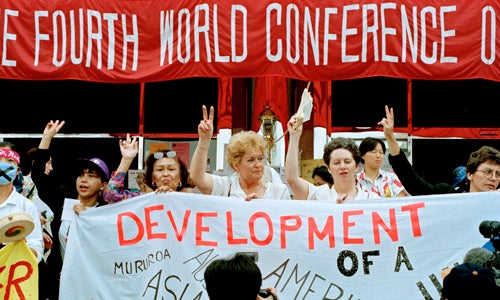Beijing at 20: ECOSOC launches review of progress on women’s rights
Date:
The United Nations Economic and Social Council (ECOSOC) has kick-started Beijing+20, a process to assess how far Member States and other stakeholders have come in implementing the commitments made at the Fourth World Conference on Women in Beijing, China, in 1995. This action was part of a resolution on the future organization and methods of work proposed by the Commission on the Status of Women which ECOSOC adopted today.

Since 1995, the Commission on the Status of Women has played a central role in monitoring, reviewing and appraising progress achieved and problems encountered in implementing the Beijing Declaration and Platform for Action – the most comprehensive global policy framework to achieve the goals of gender equality, development and peace, which world leaders committed to in 12 critical areas of concern.
At its annual sessions, the Commission has focused on particular priority themes in an effort to accelerate implementation. It led the first five-year review in 2000, when the 23rd special session of the General Assembly adopted a political declaration and further actions and initiatives to implement the Beijing Declaration and Platform for Action. The Commission also conducted comprehensive reviews in 2005 and 2010, which both resulted in declarations on the occasion of the 10- and 15-year anniversaries of the Beijing Conference.
The review and appraisal process launched today by ECOSOC will include: comprehensive national-level reviews to be undertaken by all States of the progress made and challenges encountered; regional reviews to be undertaken by the five UN regional commissions; and a review and appraisal at global level, to be undertaken by the Commission on the Status of Women at its 59th session in March 2015. At that time, the Commission will also assess opportunities for strengthening gender equality and the empowerment of women in the post-2015 development agenda, currently under consideration by UN Member States.
ECOSOC strongly encouraged Governments to continue to support the role and contribution of civil society, in particular non-governmental organizations and women’s organizations, in implementing the Beijing Declaration and Platform for Action and the outcomes of the 23rd special session of the General Assembly. In this regard, it called upon Governments to collaborate with relevant stakeholders at all levels in their preparations for the 2015 review.
“This comprehensive review and appraisal process is critical for ensuring accountability by Member States for commitments made to the world’s women and girls nearly 20 years ago in Beijing,” said Acting Head of UN Women Lakshmi Puri. “While much progress has been made, in no country in the world has true equality for women and girls been achieved.”
Ms. Puri stressed the timeliness of the review process, which coincides with the target date for achieving the Millennium Development Goals. As Member States, the UN system and other stakeholders redouble their efforts during the 1,000 Days of Action drive, targets directly related to women’s well-being lag behind many of the others.
“The Beijing+20 review is not only an opportunity to critically assess progress as well as remaining gaps and challenges,” said Ms. Puri. “Even more importantly, we must turn it into a galvanizing process for implementing the norms, policies and measures identified in the Platform for Action, for reaffirming and strengthening political commitment, mobilizing all stakeholders, and making the investments needed at all levels to achieve gender equality, women’s rights and women’s empowerment. UN-Women will be a strong and committed partner to Member States, the UN system and civil society as we work towards this common goal.”